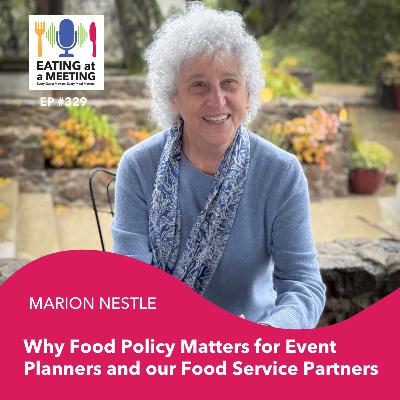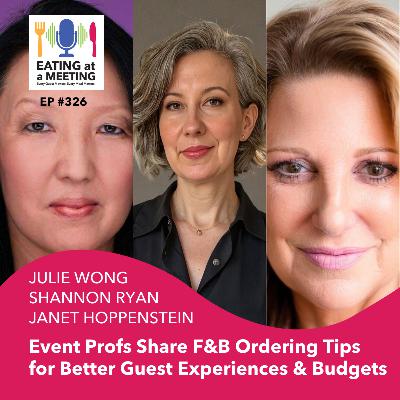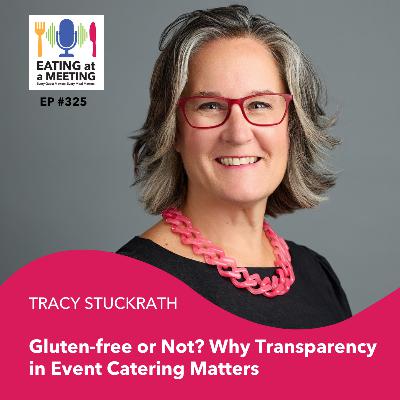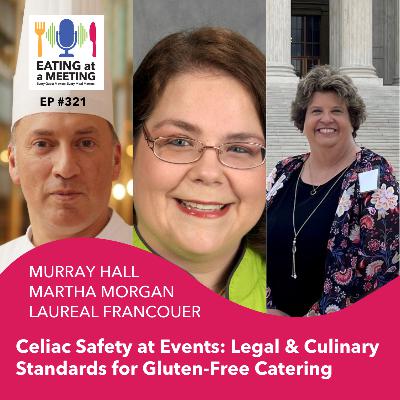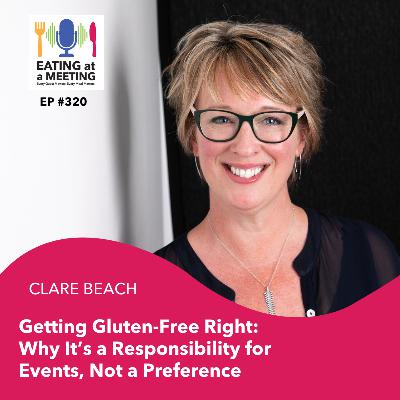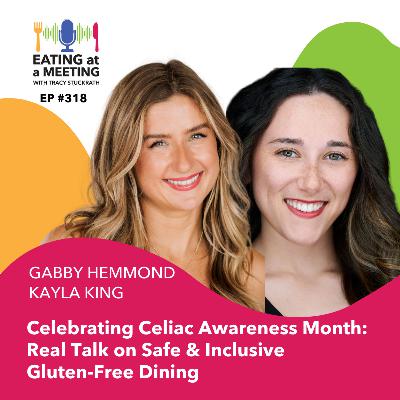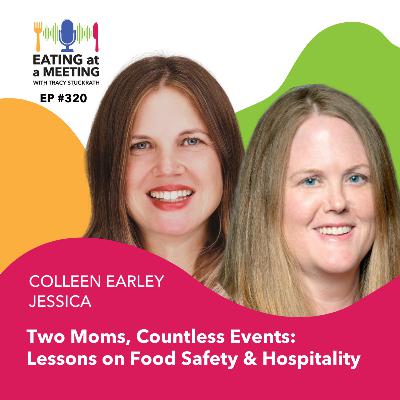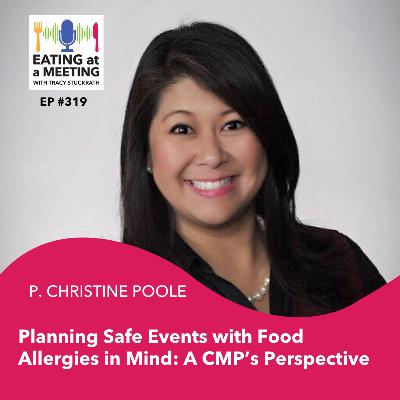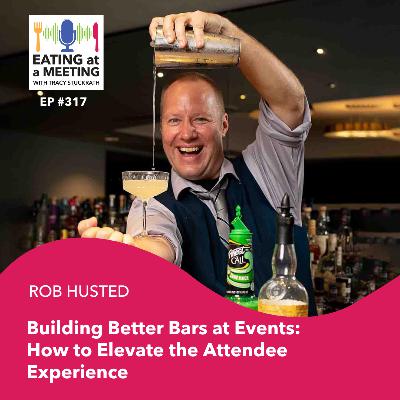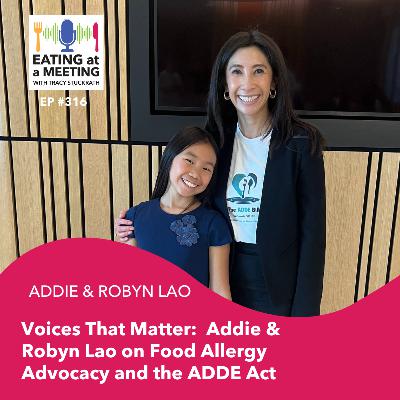Discover Eating at a Meeting
Eating at a Meeting

Eating at a Meeting
Author: Tracy Stuckrath, CFPM, CMM, CSEP, CHC
Subscribed: 7Played: 10Subscribe
Share
© Tracy Stuckrath, thrive! meetings & events
Description
Eating at a Meeting explores a variety of topics on food and beverage (F&B) and how they impact individual experience and inclusion, sustainability, culture, community, health and wellness, laws and more.
The mission of Eating at a Meeting is to share authentic stories that illustrate the financial, social, emotional, and mental impact food and beverage have on individuals, organizations, and the earth. I see it being threefold:
● Help individuals and organizations understand how F&B
impacts employee, customer and guest experience, the
planet and the bottom line.
● Help those growing, producing, preparing, and serving
F&B understand the duty of care they hold in food safety
and inclusion as well as the opportunity they have to
create experiences that are safe and inclusive.
● Support those with dietary needs by gathering their
insight on eating at a meeting with dietary needs,
helping them better advocate for themselves and
educating them on the processes found on the other
side of the kitchen door.
The mission of Eating at a Meeting is to share authentic stories that illustrate the financial, social, emotional, and mental impact food and beverage have on individuals, organizations, and the earth. I see it being threefold:
● Help individuals and organizations understand how F&B
impacts employee, customer and guest experience, the
planet and the bottom line.
● Help those growing, producing, preparing, and serving
F&B understand the duty of care they hold in food safety
and inclusion as well as the opportunity they have to
create experiences that are safe and inclusive.
● Support those with dietary needs by gathering their
insight on eating at a meeting with dietary needs,
helping them better advocate for themselves and
educating them on the processes found on the other
side of the kitchen door.
331 Episodes
Reverse
I'm thrilled to welcome Marion Nestle for a special Tuesday episode of Eating at a Meeting Podcast LIVE! Marion is one of the most respected voices on food policy, nutrition, and food industry influence — and I've been following her work since 2009. Her insights continue to shape how so many of us think about what's on the plate and why it matters. In this conversation, we'll explore why food policy matters for event planners and our food service partners — and why understanding these broader influences is essential for anyone responsible for planning meals and menus at events. 👉 How do industry power structures impact what we serve? 👉 Why does consumer trust matter when designing food and beverage experiences? 👉 What responsibility do planners and food service professionals have in creating safe, sustainable, and ethical dining environments? If you're involved in planning, designing, or serving food at events, this is a must-listen — Marion's insights will inspire you to think far beyond taste and trends.
What does a moldy orange have to do with food and beverage at your next event? A lot, actually. This week on Eating at a Meeting Podcast LIVE, I'm talking with Rachael Jackson—journalist, food-waste educator, and founder of the award-winning website EatOrToss.com—about how we can stop tossing perfectly edible food, and what that means for planning events that are not just delicious, but responsible. Rachael has helped millions of people rethink what goes in the trash, using humor, science, and common sense. She's also helped restaurants and government agencies reimagine menus and policies to keep food out of landfills and on people's plates—where it belongs. From too-big serving trays and buffet overkill to "just in case" stockpiles that never get eaten, we're digging into: 🥗 The simple menu swaps that reduce waste (and costs) 🍰 Why those leftover desserts shouldn't hit the dumpster ♻️ How service styles and portion sizes impact sustainability 🧾 Why transparency and storytelling matter for food choices 🥡 And why "encouraged leftovers" should be an industry standard If you're a planner, caterer, venue, or chef trying to do food and beverage better—this is for you. Rachael's approach makes the science of spoilage approachable, and the case for change undeniable. Whether it's one guest or a gala, every bite should matter.
As evolving food allergy regulations sweep across the US, I dedicated this solo episode to giving you the latest updates on the legal landscape affecting safe dining experiences. This week, it's just me, Tracy Stuckrath, but together we're diving into the details behind newly proposed and enacted legislation from Pennsylvania, California, Illinois, and Texas, along with major changes in the 2022 FDA Food Code and proposed allergen labeling requirements for alcoholic beverages by the TTB. I break down what these changes mean for restaurants, catering professionals, and anyone who wants to ensure food-allergic guests are protected and included. You'll hear candid tips on risk management, advocacy, and the power of positive, inclusive dining stories that build trust and community. Whether you're an event pro or just determined to create safer, more inclusive food experiences, tune in to stay ahead on all things food allergy law and regulation.
Imagine using your food and beverage choices to not just nourish guests—but to help someone rebuild their life. Next week on the Eating at a Meeting Podcast LIVE, I'm sitting down with Kerry Brodie, founder and executive director of Emma's Torch, a nonprofit culinary training program that empowers refugees, asylees, and survivors of human trafficking by providing paid culinary training, work experience, and job placement—all through the lens of dignity, sustainability, and inclusion. Emma's Torch is about far more than cooking skills—it's about building confidence, fostering community, and helping individuals navigate new lives and achieve financial independence. Since its founding, they've worked with over 600 students, generating more than $25 million in increased wages as graduates go on to become business owners, bakers, supervisors, and more. For planners and hospitality professionals, this conversation is a powerful reminder that every meal we serve at an event is a chance to make an impact—not just on guests' plates, but in their lives. If you want your events to reflect purpose as well as taste, this is a conversation you won't want to miss.
As event planners, we know that food and beverage is rarely just a line item—it's an experience, a connector, and sometimes a challenge. In this week's Eating at a Meeting LIVE, I'm gathered a group of event planners — Janet C. Hoppenstein, CMP, Shannon Ryan, CMP, and Julie Wong, CMP — for an open conversation about how they navigate ordering F&B for their events: what guides their decisions, what concessions or compromises they make, and how they think about the attendee experience when planning menus. We'll talk about: ▶︎ How budget, inclusivity, sustainability, and logistics come into play ▶︎ What they wish venues and caterers understood better ▶︎ How attendee expectations are changing—and how planners are adapting Whether you're a planner yourself or part of a catering or venue team, this conversation will offer insights that can help you deliver better, more thoughtful food and beverage at your next event. Join me and bring your own questions or stories to the chat!
When the Rice Isn't the Issue: A Real Talk on Food Safety, Chef Pushback & Guest Trust This week, it's just me—no guest, just the truth. At a recent event, I was told by a chef that rice—specifically Uncle Ben's—was the reason a gluten-free option couldn't be provided. But we'd already discussed that on our prep call. I had asked for gluten-free rice. We agreed. And then… the night of the event? Nothing was gluten-free. His response? "Just put 'Uncle Ben's' on the sign. Some gluten-free people are fine with it." And when I asked what I could eat, he said, "We won't kill the meeting planner—we'll make you something else." Spoiler alert: Uncle Ben's plain rice is gluten-free. So the issue wasn't the rice. It was the lack of follow-through. It was the dismissive attitude. It was the failure to respect the safety of every guest. In this episode, I'm diving into: • Why food safety requires transparency—not assumptions • How "good enough" is not good enough • The responsibility of hotels and planners to deliver on dietary promises If you've ever been gaslit about a dietary request—or told to "just eat something else"—pull up a chair. You're not alone. And this conversation needs to be had. See less
This week, I'm talking with Ashley Orr, the powerhouse baker behind Sweet Nothings Bakery and Cafe—a 100% gluten-free bakery operating out of a shared kitchen space. Yes, you read that right. Shared kitchen. Not a dedicated gluten-free facility. Sound familiar? For any planner who's been told by a convention center or hotel that "we can't do gluten-free," Ashley's story is proof that it can be done—with the right knowledge, systems, and commitment. Diagnosed with a gluten allergy in 2019, Ashley didn't just change how she ate—she reimagined how to bake, launching her business to fill the flavor gap in gluten-free baked goods. Now baking alongside other (non-GF) businesses at Little Blue Bakehouse, she takes meticulous care to protect her products and her customers from cross-contact, and the results speak for themselves. In our conversation, we'll explore: • How Ashley safely operates in a non-dedicated kitchen • The protocols that protect her gluten-free guests • What venues and planners can learn from her model • Why SOPs—not just suppliers—are key to safe dining Whether you're serving 10 people or 10,000, this is a must-watch for anyone who's been told "we just can't do that." Ashley is doing it—and doing it well. Let's talk about how.
What's on the Menu? Voices of Change in Food Journalism Food writing is more than recipes—it shapes culture, policy, and the guest experience at every table. In this Eating at a Meeting LIVE episode, I'm sharing clips from two powerhouse conversations recorded at the inaugural Les Dames d'Escoffier M.F.K. Fisher Women in Food & Storytelling Symposium, where Eating at a Meeting served as Media Sponsor. First up: Toni Tipton-Martin and Ruth Reichl pull back the curtain on the evolution of food journalism—from the era when recipes were relegated to "women's pages" to groundbreaking storytelling that made space for new voices. Hear how mentorship, risk-taking, and saying yes to what scares you can transform not only careers, but entire industries. Then Kat Craddock, Editor-in-Chief and CEO of SAVEUR magazine, moderates a powerful discussion with Marion Nestle and Grace Young. Together they reveal how food writing preserves culture, sparks advocacy, and even protects vulnerable communities—from exposing industry influence on public health to fighting for the survival of America's Chinatowns. These women remind us that journalism isn't just about documenting what's on the plate—it's about shaping how we understand food's role in society. For event professionals, planners, and anyone feeding communities, their insights underscore why every menu choice and every story told at the dining table matters.
Imagine this: You're out to dinner with your staff. One of them has celiac disease. The server doesn't know what gluten is. The kitchen isn't sure either. That moment? It sparked real change in Illinois. In this episode of Eating at a Meeting LIVE, I'm talking with State Senator Sally Turner, the powerhouse behind Senate Bill 1288—a bill that could soon make Illinois one of the safest places to dine out if you live with celiac disease. It's a big deal. This new law (awaiting the governor's signature) would require ALL food handlers in the state to be trained on celiac disease, gluten-free protocols, and preventing cross-contact. Senator Turner shares how a personal connection turned into statewide action—and why this matters not just for restaurants, but for anyone planning events, catering menus, or feeding guests. Because safety shouldn't depend on luck. It should be built into the system. We'll cover: ✅ Why the bill passed unanimously ✅ What it means for hotels, venues & caterers ✅ How this legislation could shape SOPs and training far beyond Illinois ✅ Why awareness isn't enough without action Whether you're gluten-free, planning meals, or pushing for safer dining—this conversation is one you'll want to be part of.
In this episode, Tracy is joined by Chef Murray Hall, Chef Martha Morgan, and disability rights attorney Laurel Francoeur to discuss an issue that should no longer be happening—venues refusing to provide safe meals for guests with celiac disease. An event planner recently posted that the kitchen at her event venue "doesn't accommodate" celiac guests. Not a preference. Not a lifestyle. A medically necessary dietary need—and still being dismissed. She is asking the network of planners for suggestions to order about 10 celiac-friendly meals in a particular city. Chef Murray's take? "Crazy that this is still happening. Most places have shifted to this being the norm, not the exception." We'll break down: ▶︎ Why "we don't do that" is an unacceptable—and sometimes unlawful—response ▶︎ How kitchens can safely serve gluten-free meals when they choose to ▶︎ What planners can say to push back and advocate for their attendees ▶︎ Why inclusive dining should be the baseline, not the exception If you've ever had to scramble to feed your guests safely—or felt like you were the only one fighting for what's right—this conversation is for you.
As May—and Food Allergy Awareness and Celiac Disease Awareness Month—wraps up, I'm delighted to bring you a truly impactful conversation with Claire Beach, Catering Director at Azura Events in London. Claire is a passionate advocate for inclusive and sustainable event planning, drawing deeply from her own lived experiences as a gluten-free, neurodivergent attendee. In this candid episode, we explore what it actually means to get gluten-free right at events—and why it's a true responsibility, not a mere preference, for everyone involved in our industry. Claire and I dive into how communication, education, and empathy are at the heart of providing safe, empowering, and waste-conscious dining experiences for all. Tune in to hear practical strategies her new UK task force is pursuing, plus creative ideas to ensure every guest feels truly welcomed and included. You'll hear the real-life impact—physical, emotional, and professional—of getting it wrong and how we can all do better.
At the end of Food Allergy and Celiac Disease Awareness Month this May, I was thrilled to chat with Benji Koltai, co-founder and CEO of Galley. On this episode, Benji brings his personal journey with Crohn's disease and gluten intolerance, pairing it with his tech expertise to revolutionize food safety from the inside out. We dive deep into what "recipe first, people always" truly means—exploring how a digital recipe system transforms food safety, allergen awareness, and food waste in kitchens from hotels to college dining. Benji shares how Galley empowers foodservice teams—reducing food waste, streamlining operations, and making dining safer for everyone with dietary needs. Listen in to discover powerful stories from clients, the real numbers behind food waste savings, and how a single source of culinary truth can change the guest experience and bottom line. Benji's insights on technology, transparency, and compassion are game changers!
How do we truly build community through food? In this episode of Eating at a Meeting, I'm joined by two inspiring professionals—Jenny Ng, Event Planning Senior Manager at National Co-op Kosher, and Rachel, General Manager & Food and Beverage Director at a locally-focused hotel restaurant—to unpack this very question. Fresh from my presentation at MPI Minnesota, we dive into what it means to connect people using food and beverage, and how thoughtful sourcing, labeling, and inclusive practices translate into memorable, meaningful events. Jenny shares how her team champions dietary inclusivity and sustainability—think robust labeling, creative themed menus, and even mocktail alternatives, so every attendee feels seen and served. Rachel offers her perspective from the hotel and restaurant world, where managing without a banquet manager means she wears all the hats—and why knowledge, training, and local partnerships are critical to crafting a welcoming dining experience for all. Together, we discuss practical tips—from putting detailed menus on conference apps to advocating for your attendees' dietary needs and pushing back on venues when needed. We reminisce about the power of themed events, the role of childhood hospitality lessons, and the joy of a well-made mocktail. Plus, you'll hear our wish lists for the future of catered food functions—more variety, more transparency, and more community at every table. Give it a listen—and let's keep building community, one shared meal at a time.
In honor of both Food Allergy Awareness Month and Mental Health Awareness Month, I was thrilled to welcome Amanda Whitehouse, licensed psychologist, food allergy anxiety and trauma expert, host of the Don't Feed the Fear podcast, and a devoted food allergy mom, to Eating at a Meeting. Amanda and I dove into the rarely-discussed intersection of food allergy safety and mental health. Too often, we focus on labeling foods and avoiding allergens at events, but what about managing the underlying fear, trauma, and anxiety that come with living (or parenting) with food allergies? Amanda opened up about the deep-seated worries food-allergic individuals carry to every buffet, the impact of recurrent trauma from allergic reactions, and the often overlooked mental toll of social and professional situations involving food. We unpacked the crucial need for "emotional safety" alongside physical safety, practical ways planners and foodservice professionals can alleviate anxiety, and why inclusive, empathetic communication truly matters. Amanda also shared grounding techniques, misconceptions about allergy anxiety, and how to build confidence navigating a sometimes isolating world. Tune in for powerful stories, expert insights, and actionable tips to create events where everyone feels seen, heard, and safe—both on their plate and in their hearts.
How does being a food allergy mom change how you plan an event menu? This week, I'm talking with two powerhouse planners—Colleen M. Earley, CMP, HMCC and Jessica Hiemenz-Woodbury, CMP, CMM, DES—who are blending personal experience with professional expertise to reshape how we think about food at events. Both are long-time event pros. Both are moms. Both know what it's like to sit at a banquet table hoping the kitchen gets it right—because their children's safety (and their own, in Jessica's case) depends on it. Together, we talk about: • Planning with intention when food allergies are part of your family • Why checklists and contracts aren't enough • What inclusive F&B really means from both sides of the table • How planners can lead change—even when they don't control the kitchen Jessica brings her insight as a mom of two kids with multiple food allergies— dairy, eggs, sesame, pea protein, lentils, and all nuts—an event strategist, a vegan, and past PCMA New England president who's led major conferences and embraced digital innovation. Colleen shares how her daughter's nut allergy journey has inspired her legislative advocacy and shaped how she builds safer dining experiences at the events she plans for clients. Their stories are a must-hear for anyone in the hospitality and events world who wants to stop treating food as just a checkbox—and start making it a tool for belonging. Join us for a heartfelt, practical conversation that just might change how you see the next plated meal at your event. What steps have you taken to ensure your F&B is inclusive?
During Food Allergy Awareness Week this year, I was joined by veteran meeting planner P. Christine Poole, CMP—someone who knows firsthand how a single overlooked ingredient can turn a meal into a medical emergency. With more than 20 years of experience planning conferences for state, regional, and national associations, Christine has a sharp eye for logistics, hospitality, and detail. But after developing an adult-onset pine nut allergy, she's experienced the other side of the table—where even clear communication with hotel staff doesn't always protect guests. In this episode, Christine shares the emotional and physical toll of navigating food allergies at events she didn't just attend—she helped plan. She's had three separate incidents at hotels where pine nuts were served despite her documented allergy. One chef even assured her the dish was safe because he'd made it himself. It wasn't. Together, we explore: • What these incidents reveal about breakdowns in communication between culinary teams and guests • Why F&B protocols must go beyond "just ask the chef" • What planners and venues must do to prevent allergic reactions—not just respond to them This isn't just about pine nuts. It's about responsibility, risk, and respect for the lives sitting at every table.
What does it really take to feel safe, heard, and included when you're dining with celiac disease? In honor of Celiac Awareness Month, this episode of Eating at a Meeting brings real talk—and real solutions—to the table with two powerhouse advocates: Kayla King (@celiacwithkayla) and Gabby Hemond (@noglutengabby). Kayla is a certified nutrition coach, Restaurant Growth Lead at Fig, and founder of the MyMeal app. Diagnosed at 8, she's spent over 17 years navigating celiac disease and is now helping others eat confidently through honest restaurant reviews, advocacy for stricter labeling, and tools for safer dining. Gabby hosts the Celiac Disease Foundation's Celiac Teen Talk, a virtual meet-up series for teens navigating the gluten-free lifestyle. Diagnosed in 2020, she's built a vibrant community by sharing personal stories, travel tips, and practical advice to help others—especially young people—feel empowered and supported. Together, we'll explore the realities of eating out with celiac, the emotional and social impact of dietary restrictions, and how to create food and beverage experiences that are truly inclusive. From tech tools and teen talk to restaurant risks and labeling myths, this conversation is packed with actionable insights for anyone who wants to do gluten-free right. Whether planning menus, supporting a loved one, or living gluten-free yourself, this episode will leave you better informed and more inspired. Let's celebrate Celiac Awareness Month by raising the bar for what gluten-free dining should be.
When it comes to creating unforgettable experiences behind the bar, few have done it better — or longer — than Rob Husted. With nearly three decades of experience in bartending, mixology, flair, and education, Rob is a force who's helped shape beverage programs and trends across the globe. Tracy had the chance to meet Rob at Catersource earlier this year, just as he was preparing to deliver his Batch Perfect: Elevating Events with Signature Cocktails & Mocktails session — a standing-room-only crowd that spoke volumes about his reputation and expertise. From founding BarWars LLC and Cocktail Network Live to staffing events through Cocktails4Hire, Rob's mission is simple: elevate the craft so bartenders — and their guests — have better, more memorable moments. This week, Rob and I are talking about what it means to create quality cocktails quickly without sacrificing entertainment, hospitality, or safety — a critical balancing act for any event planner working with F&B. We'll explore how training, performance, and drink development come together to enhance guest experience and what planners need to know when hiring bartenders for receptions, galas, and conferences. If you care about creating beverage moments that truly connect with your attendees (not just fill their glasses), this is a conversation you'll want to listen. Cheers to raising the bar — see you there!
On this episode of Eating at a Meeting, I welcome Addie Lao, a courageous nine-year-old food allergy advocate, and her mom, Dr. Robin Lao, a pediatric nurse practitioner from Sacramento, California. Together, these two inspiring women are leading the charge for safer dining experiences in California with their coauthored California Senate Bill 68 — the Addie Act. We dove deep into their journey: from the transformative moment of Addie being able to eat safely at a Chinese restaurant because of clear allergen labeling, to the challenges and triumphs of advocating for legislation that would require all California restaurants to list the top nine allergens on their menus. Robin shared the legislative process, their advocacy in the state Capitol (including Addie testifying before senators — with her whole third-grade class cheering her on!), and the ripple effect this bill could have for millions of diners, families, and the food and beverage industry. You'll hear the real impact of food allergies on daily life, the importance of inclusivity, support needed from restaurants and the community, and why food allergy diners are among the most loyal customers. Discover how this mother-daughter team is turning adversity into action, the steps restaurants and individuals can take to help, and why sharing your story truly matters. Join us in supporting the Addie Act at additellsall.com and be part of the movement for safer, more inclusive dining everywhere.
Tea is having a moment—and it's long overdue. In this week's episode of Eating at a Meeting, I'm joined by Amy March, executive chef and co-founder of The Steeping Room and Urban Tea House, to talk about why tea deserves a starring role on your event menu. With over two decades of experience in specialty tea, culinary arts, and holistic health, Amy brings the perfect blend of insight and inspiration for planners looking to serve more than just caffeine. We will explore how tea can create moments of calm, spark cultural connection, support wellness goals, and build community at the table. Amy shares real strategies for incorporating tea into events—from elegant stations and immersive tastings to seasonal pairings and signature mocktails—turning every pour into an opportunity for impact. And if you've ever questioned whether your F&B dollars could be better spent, this episode offers a deliciously purposeful alternative to that pricey pot of coffee. Let's rethink the role of tea and use it to steep our events in intention, connection, and creativity.


